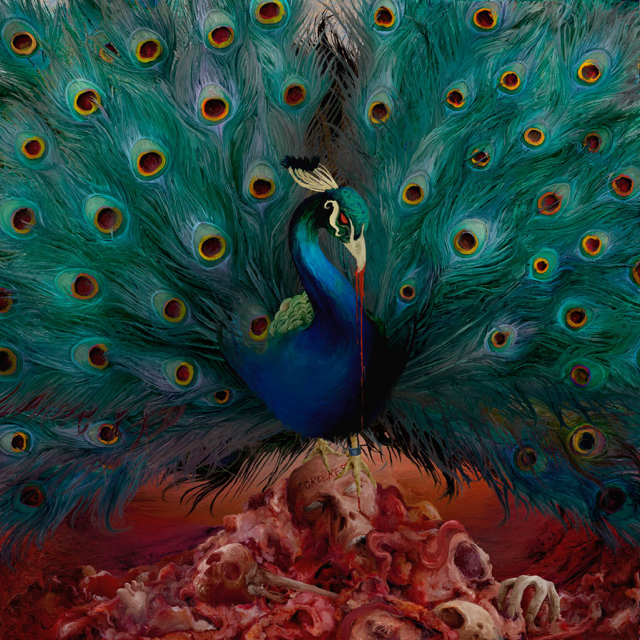OPETH - Sorceress
October 4, 2016, 8 years ago
(Nuclear Blast)

I have a very strict rule every Sunday. NO new music. It has to be from another era, preferably the ‘60s and early ‘70s. It’s a way of respecting the roots, learning about the history. And if you haven’t heard a release from 1969, then it’s no different than a new album coming out today. Your ears are virgin to both. So how does Opeth go from a gurgling, epic death metal monster to something influenced by a “reverse Bob Dylan,” as Mikael Åkerfeldt told Rolling Stone? That’s the conundrum. So it seems that he has lost the passion for the former. Now that doesn’t make him any less of a musician, although it might make some of us extremists pass on the fad of Opeth to another generation as we still chose to play in Blackwater Park and venture no further.
But I’m on the side of Mr. Åkerfeldt, as he continually leans away from his death metal gurgling, gargling, whatever you want to call it. Cookie Monster vocals! Alas, his cookie cravings seem to be long gone. But no need to fret; he has other tricks up his sleeve that are more menacing. As per my classic rock comment—or some say Psychedelic Psunday, stolen from any number of poorly play-listed FM stations—Sorceress is not that far removed from yesteryear. And it’s quite common knowledge that Åkerfeldt is a vinyl addict and continuous collector (and that’s original vinyl, not the plethora of money-sucking reissues we see daily).
And he’s wearing those prog/psych influences on his sleeve quite proudly. As well, the recording setting of Rockfield Studios only adds to the allure and waxing nostalgically to an earlier time, as everybody from Queen to Black Sabbath and Budgie have produced momentous works of heavy art there.
Sorceress commences with acoustics that could easily be found on a Simon & Garfunkel album. “Persephone” sets the tone with a near two minutes of melancholy and female spoken word as focus, personifying an album dealing with certain negative aspects of love. Then the title track kicks off with an Iron Butterfly-inspired organ until the chugging beast begins, although the effect is far from Opeth’s earlier death metal beginnings. “The Wilde Flowers” continues with the hippie groove, Åkerfeldt pretty comfortable in his bell bottom blues. The song showcases the incredible depth and range of his voice. The track actually ends with a brutally explosive outro led by drummer Martin “Axe” Axenrot, giving us extremists a bit of hope.
“Will O The Wisp” possesses a Jethro Tull feel without the flute, but with more shining acoustics and a ornate backdrop of keyboards. Åkerfeldt and guitarist Fredrik Åkesson duel to the end. “Chrysalis” is galloping and punchy, Hawkwind-ish in its epic nature and clocking in at over seven minutes. The driven ”Axe” is the dominant figure on the track, while Joakim Svalberg’s synthesizer goes toe-to-toe with the riffs. And like many classic Opeth pieces, the band shifts gears as the tune gradually fades, Åkerfeldt’s voice echoing into the sunset. This one is dark and beautiful. And fans that don’t get it should open their metal mind—there’s both history and growth here with each step.
“Sorceress 2” appears to kick off “Side 2” as it were, the band crafting another acoustic-driven powerhouse with harmonious but haunting and echoey vocals. “The Seventh Sojourn”—nothing to do with The Moody Blues album—has a Middle Eastern tone in acoustics, percussion and keys. And you begin to think it’s completely instrumental... until a church choir of voices fill the room. The track merges into “Strange Brew,” not a Cream salute but a song almost Pink Floyd-esque in tone and temperament. But that mood changes into borderline anger with the drop of the kick drum. And as I sit here dumbfounded, I’m beginning to grasp the incredible depth of this Sorceress. And it ain’t gonna take one listen to sink in, as there is plenty to devour here. My gut instinct tells me, as with all long-lasting pieces of art, the album will morph upon each listen, every step of the way.
Next up, the savoury “Brew” leaves a sour taste in your mouth as Åkerfeldt’s whisper stings like a wasp. “A Fleeting Glance” prances back and forth, almost Beatles-like as the magical mystery tour continues. “Era” kicks off with tinkling keys of a piano until a powerful tsunami of headbanging emerges. Passion fuels this game and Åkerfeldt continues to have one foot in hot coals, the other in smothering mud. The point is, he continues the balancing act of past influence and reinvention. I can picture this in stadiums around the world, it’s so large and all-consuming. “The devil lives in you…” As we come to a close, “Persephone (Slight Return)” is a grand finale that reflects the way the opus began, with piano meeting a spoken word outro as Opeth tie a bow around their bitter love story.
Once again, the Swedes continue to rework the world of heaviness, pointing in directions past, present and future. Part Audience, part Armageddon and part Atomic Rooster, but all Opeth in 2016. Strap in for a magic carpet ride you won’t soon forget.











